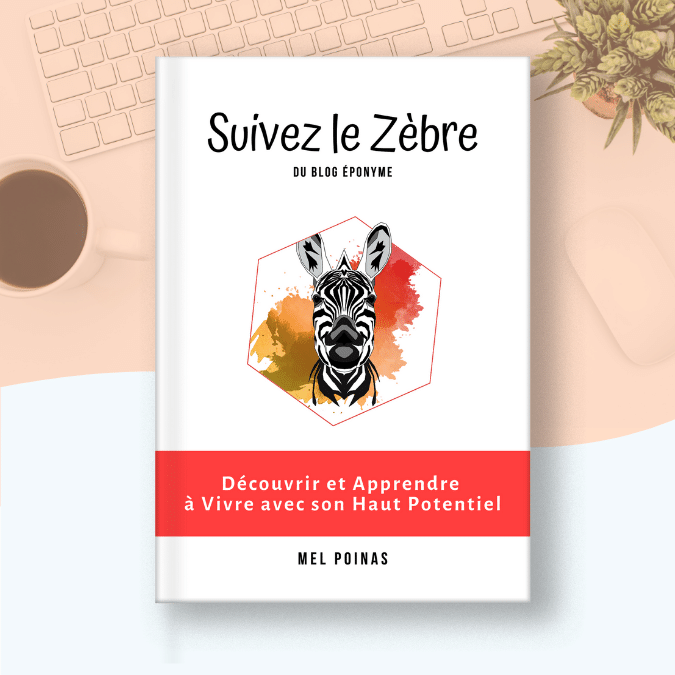What role do HPI profiles play in the company?
The subject of work often comes up when discussing HPI (High Intellectual Potential).
Do HPI profiles have more difficulty find their place in the company? Are they more prone to burn-out ? Is the quest for meaning a sine-qua-non condition for HPI profiles ?
Until a few years ago, HPI profiles were little known to the general public. We used to talk more about zebras (hence the blog’s title) or HP for high potential, and eventually about gifted or precocious people. But TF1’s hit series HPI, starring Audrey Fleurot, changed all that.
The series was seen by over 10 million French people, i.e. nearly one in 6. The term HPI has become the benchmark for identifying and naming these profiles with their distinctive characteristics.
The high media profile of HPI
In addition to the general public’s enthusiasm for the series, a number of specialized HR media are busy democratizing the subject.
4 years ago, when I talked about giftedness in class with my 20-25 year old students, very few of them knew anything about HPI. Today, most of them, if not all, are familiar with this theme.
The advantage of mass media is the speed with which they can transmit information. ever since the subject of HPI has fascinated and even unleashed the crowds, company directors, managers and employees have been overcoming old clichés about HPI profiles.
We no longer think of the gifted person as a slightly perched engineer with laughing eyes and shaggy hair, even if we all love that photo of Albert Einstein. The HPI profile still gives rise to fantasies, but they’re different.
HPI profile: an opportunity for the company?
While each HPI profile is unique in its individuality, high potentials are generally characterized by their ability to analyze a situation. There’s also this ease of making connections, what some call tree thinking, with each idea spawning another. All human beings have divergent thinking, but what makes HPI profiles special is the speed at which this information is transmitted, and a denser neuronal tissue.
In business, an HPI person likes the challenge of complex situations. Like Sherlock Holmes, he loves puzzles and mysteries to solve. It’s hardly surprising that many HPIs work in engineering, design or production management and efficiency improvement.
Many HPIs are highly intuitive, creative, emotionally hypersensitive and demanding, sometimes to the point of excessive perfectionism. Every detail is important. these are profiles that are very attentive to detail.
Despite these undeniable advantages, the HPI profile has a few pitfalls! Communicating with an HPI profile can be complex. Convinced he’s always right, respect for authority isn’t really his strong suit. He will respect a manager who inspires him and whom he trusts. You have to earn respect with an HPI. The manager, the company, the leader must be up to the task of retaining an HPI.
The requirements of HPI profiles and their professional expectations
If I tell you about my own experience, I can’t say that my time in the corporate world was a smooth ride, even if it did bring me a lot. I’m one of those people who aren’t cut out to be a salaried employee .
Why? Because, like many HPIs, my “unionist”, idealistic, passionate side, as well as my abilities, were often singled out by my employers. They didn’t know how to handle me. I was like a ticking time bomb. I excelled in my missions, but my behavior was out of step with my status.
At the same time, I didn’t understand the statement! I was often hired for my skills in innovation and my ability to look at things from a disruptive angle, except that it’s impossible to put aside my personality, my emotions and my values.
I can’t separate my brain from my personality. HPI profiles are whole.
My HPI testimonial
For years, I thought I had a problem because I changed companies every year. There were many reasons for this:
- boredom
- redundant missions
- disagreement over top management
- lack of alignment with corporate values
- poor work/life management
- excessive time constraints
- objectives that are often financial, but rarely human
- the lack of recognition and consideration for my work and that of my colleagues
None of my employers managed to pick up on the fact that I was a high-potential profile.
I can’t blame them, as I don’t know myself.
But boredom wasn’t my only obstacle. There were also the company’s values, what it exuded. Then there are the leaders who embody these values, the management, the consideration of us human beings as employees.

Try to find a company with values you can identify with.
Could I identify with this company? Finally, did I feel in resonance with its values, its leader, its managers, etc.?
For a long time I didn‘t think any company was right for me. There’s no job in which I’d be truly fulfilled. That, in the end, if I wanted this ideal job in this ideal structure, I’d have to create it myself, tailor-made…
I have an atypical profile, I’m a zebra, high potential, gifted. I was relieved to hear it. But even though I know this, it didn’t help me to flourish in my job. On the contrary, I resigned 40 days after my test was validated.
I quit because, as a zebra, I need freedom AND to find meaning in what I do AND to resonate with the people I work for. Now I know and accept myself! Thank you personal development ^^. 😀

So, for me, working 35h / 39h / 42h is difficult over the long term…
I don’t like the idea of working 8.30 a.m./6 p.m. every day, with (only) 5 weeks’ vacation a year. It would even put me on a false rhythm… Just like when you’re running with someone whose stride you don’t share, you can quickly underperform!
My rhythm will vary enormously. Some days I’ll be able to do the equivalent of 3 days’ work in one day. On the other hand, I’m so exhausted that for the next 4 days, I’ll be idling.
Gifted people have their own pace of life.
I need to work at my own pace and when I feel like it. Besides, I never do just one thing, I always have 15,000 projects in mind, especially in my personal life… The blog, for example, is one of them, but it’s not the only one…
I want to do everything, do it all at once, and I get exhausted, because in fact I’m working all the time, or at least my brain is clearly working all the time! That’s what being a zebra is all about. Sometimes being able to forget to eat because you’re so into something…
As a result, the Métro, boulot, dodo formula… It’s not for me. I’m lucky, I live with someone who supports me in not having a “normal” life and who never takes it out on me. And I often thank her for that, because it gives me a lot of freedom in my life and, above all, I don’t feel guilty about it! (article: romantic relationship with a non-zebra person)
But, let’s be honest, what boss would accept someone showing up for work at 11am and leaving at 3pm? Or that we come in one day at 8am and leave at 2am, but don’t come in the next?
Yes, it sounds quite utopian! 😉
Gifted, high potential, zebra: unidentified disruptive and innovative profiles.
I’ve always dreamed of innovation because it thrills me! It’s a real challenge, and completely in line with what I’m looking for as a high-potential person.
But do we live in a society that encourages innovation and disruption ?
It’s funny because I heard these terms a lot when I was in business school myself, and more recently in the professional world, via conferences or even, a request from my employers!
How can you be happy at work if you’re gifted?
How can you be happy at work if you’re gifted?
I think there’s still a long way to go between theory and business reality!!!! A bit like school… although fortunately there are always some nice surprises 😉
So what’s the solution for corporate zebras? Being paid solely on objectives? Develop your own mission within the company? Talking about it in the job interview?
I think the answers depend on each person… The important thing is to understand and know that there’s never just one possible solution. It’s up to you to choose the one that suits you best, and in which you feel comfortable.
You can also find more information, resources and tools on Giftedness in Mel POINAS‘ book. With a lot of humor, Mel tells the story of the discovery of her giftedness and the routines she put in place to finally find her place!

Le livre
Écrit par une HPI !
Un témoignage et des solutions concrètes pour découvrir, comprendre et apprendre à vivre en étant HPI.

To go further, you can read
- Can a High Potential profile be a good manager?
- 7 tips for a successful CV when you’re a zebra
- How to tell others we are gifted?
- Impostor’s syndrome
- Giftedness : 20 characteristics of complex and laminar profiles
- How to take the WAIS 4 test?














